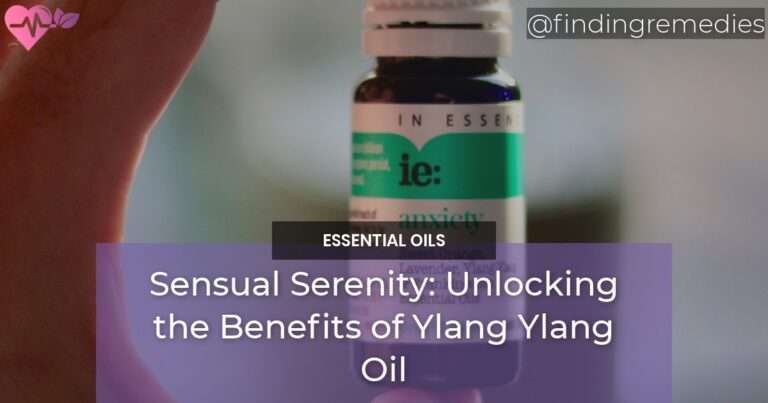Welcome to Sensual Serenity! A place to explore and discover the calming and uplifting effects of Ylang Ylang essential oil. Ylang Ylang oil has been used for centuries to promote relaxation and can be used to reduce stress, anxiety, and depression. It has also been used to elevate mood and enhance physical and emotional wellbeing.
In this article, we’ll take a look at the many benefits of Ylang Ylang oil and how it can be used in your daily life to achieve inner peace and balance. We’ll discuss the different forms of Ylang Ylang oil, the history and origins of the oil, and its uses in aromatherapy. We’ll also explore how Ylang Ylang can be used to create a calming environment and how it can be used to create a sensual atmosphere. Finally, we’ll discuss ways to incorporate Ylang Ylang oil into your home and lifestyle to help you create a happier, healthier, and more serene life.
Table of Contents
Ylang Ylang Essential Oil
Ylang ylang essential oil is extracted from the flowers of Cananga odorata, a tropical tree native to Asia. The oil is known for its sweet, floral scent and has been used for centuries in traditional medicine for its various health benefits.
Extraction Process
Steam Distillation
The flowers of the Cananga odorata tree are steam distilled to extract the essential oil. The process involves passing steam through the flowers, which releases the oil. The oil is then collected and separated from the water.
Chemical Composition
Ylang ylang oil contains various chemical compounds, including:
Monoterpenes
These compounds are known for their antimicrobial and anti-inflammatory properties, making ylang ylang oil beneficial for skin and hair health.
Sesquiterpenes
These compounds have calming and grounding effects, making ylang ylang oil helpful for reducing stress and anxiety.
Esters
These compounds have sedative effects, making ylang ylang oil helpful for promoting relaxation and sleep.
Phenols
These compounds have antioxidant properties, making ylang ylang oil beneficial for skin health and reducing inflammation.
Benefits
Ylang ylang oil has numerous benefits for the mind and body, including:
Reduces Stress and Anxiety
Ylang ylang oil has a calming effect on the mind and body, making it effective at reducing stress and anxiety levels. Inhaling the oil or using it in aromatherapy can help promote relaxation and calmness.
Promotes Hair Growth
Ylang ylang oil has been shown to promote hair growth and reduce hair loss. It can help improve blood circulation to the scalp, which stimulates hair follicles and promotes healthy hair growth.
Enhances Mood and Libido
Ylang ylang oil has aphrodisiac properties, making it helpful for enhancing libido and improving sexual desire. It can also help enhance mood and promote feelings of happiness and joy.
Improves Skin Health
Ylang ylang oil has antiseptic and anti-inflammatory properties, making it helpful for treating skin conditions such as acne, eczema, and psoriasis. It can also help improve skin elasticity and reduce the appearance of fine lines and wrinkles.
Uses
Ylang ylang oil can be used in various ways, including:
Aromatherapy
Inhaling ylang ylang oil or using it in aromatherapy can help promote relaxation, reduce stress and anxiety levels, and enhance mood and libido.
Perfumery
Ylang ylang oil is often used in perfumes and other fragrances for its sweet, floral scent.
Massage Therapy
Ylang ylang oil can be used in massage therapy to help promote relaxation and reduce stress levels.
Hair Care
Ylang ylang oil can be added to hair care products or used in a hair mask to promote hair growth and reduce hair loss.
Skincare
Ylang ylang oil can be added to skincare products or used in a face mask to help treat skin conditions such as acne, eczema, and psoriasis.
Safety and Risks
While ylang ylang oil is generally safe to use, there are some risks and safety considerations to keep in mind, including:
Skin Irritation
Ylang ylang oil can cause skin irritation in some people. It is important to dilute the oil before applying it topically and to do a patch test before using it on larger areas of the skin.
Allergic Reactions
Some people may be allergic to ylang ylang oil. It is important to do a patch test before using the oil and to discontinue use if any allergic reactions occur.
Internal Consumption
Ylang ylang oil should not be consumed internally, as it can cause nausea, vomiting, and other adverse reactions.
Pregnancy and Breastfeeding
Ylang ylang oil should be used with caution during pregnancy and breastfeeding, as there is not enough research to determine its safety in these populations.
How to Use
Ylang ylang oil can be used in various ways, including:
Topical Application
- Add a few drops of ylang ylang oil to a carrier oil, such as coconut oil or jojoba oil, and apply it to the skin.
- Use in a massage oil blend to promote relaxation and reduce stress levels.
- Add a few drops to a bath to promote relaxation and enhance mood.
Inhalation
- Add a few drops of ylang ylang oil to a diffuser and inhale the aroma to promote relaxation and reduce stress levels.
- Add a few drops to a handkerchief or tissue and inhale the aroma throughout the day to promote relaxation and enhance mood.
Internal Consumption
Ylang ylang oil should not be consumed internally.
Overall, ylang ylang oil is a versatile and beneficial essential oil that can be used for various purposes, including promoting relaxation, reducing stress levels, enhancing mood and libido, and improving skin and hair health. However, it is important to use the oil safely and with caution, especially if you are pregnant or breastfeeding or have any pre-existing health conditions.

